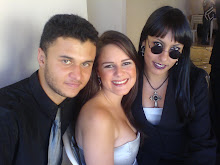How to choose the correct preposition?
I always listen to the radio in the evening before going to bed. I’m very interested in world affairs and love to hear about the way people live in other countries.
Choosing prepositions
Prepositions are the small words which you often hear between verbs and nouns. Prepositions are used to show the physical relationship between objects, or actions and objects. So, for example, we have prepositions of place and movement.
place e.g. The radio’s on the table under the window.
movement e.g. Go to the shops. / Go through the park.
However, there are two groups of words – time phrases and certain verbs and adjectives – which collocate with specific prepositions in a different way. This section will help you with these two groups.
Time phrases
Look at the following groups of time phrases. Match each group with the appropriate preposition.
 at / on / no preposition / in
at / on / no preposition / inCan you identify a pattern for the use of each preposition?
Dependent prepositions
Try to fill the gaps below with the appropriate preposition.
I enjoy studying and depend a) __________ BBC World Service for English language programmes. I’m very interested b)__________ new technology and enjoy hearing c) _________ scientific developments around the world. Also, listening d) _________ the radio helps improve my English. At the moment, I’m concentrating e) _________ improving my grammar so that I can speak with fewer errors.
As with many points of English grammar there are no constant rules which can help you learn which preposition to use. However, you can help your learning if you ...
a) make sure, when you are looking up a word in a dictionary, that you note which preposition follows it.
b) group words according to the preposition they use.This can help you identify patterns which make remembering the correct prepositions easier.
Learning task
Answer the following questions in complete sentences, using the correct preposition.
e.g. When were you born? / I was born on ...
a) When is New Year’s Day?
b) When is the weather hottest?
c) When do people in Britain have decorated trees in their houses?
d) When did William Shakespeare live?
e) When did you last listen to BBC World Service?
f) What time is your favourite programme on?
Guidelines and answers
Time phrases
Use in with months, years, decades, centuries, seasons – and parts of the day
(except for night).
Use at with times, and special times of the year. Also use at with ‘night’.
Use on with days and dates.
‘Time’ words such as next, last and ago, and words which fix a day in time
(e.g. yesterday, tomorrow) do not take a preposition.
Dependent prepositions
a) depend on, also rely on. Often verbs with similar or related meanings
take the same preposition.
b) interested in
c) hear about. Also speak about (discuss). Remember that some words
can take more than one preposition depending on the meaning you
want to convey.
d) listen to
e) concentrate on. Also focus on.
Learning task answers

a) New Year’s Day is on January 1st.
b) The weather is hottest in summer.
c) People in Britain decorate trees at Christmas.
d) Shakespeare lived in the sixteenth century.
e) I last listened on ... at ... .
f) It’s on ... at ... .
Fonte: BBC LEARNING ENGLISH

Nenhum comentário:
Postar um comentário